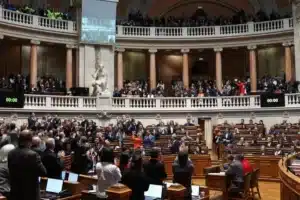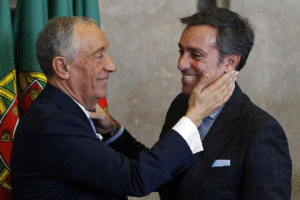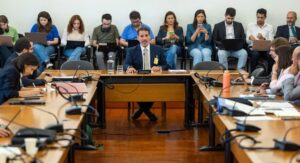Date to some is synonymous with April 25 revolution
Today, parliament commemorates the 49th anniversary of November 25, 1975, with a solemn session that will follow the model of the ceremony marking the 50th anniversary of April 25, 1974 – and which has drawn a deal of criticism from the left.
The commemorations will feature interventions, in ascending order, from all parties with parliamentary representation, with the exception of the PCP, which has already announced that it will not be attending.
Each parliamentary group will have five and a half minutes to speak – thirty seconds less than in the similar commemorations for April 25 – with the exception of the sole PAN deputy, who will have to limit her speech to two minutes. This time limit rule will not, however, apply to Marcelo Rebelo de Sousa or parliamentary speaker José Pedro Aguiar-Branco.
As happened in the last solemn session of April 25, the ceremony will have military honours, the national anthem will be played (twice) and parliament will be decorated out with flowers, “although not with red carnations”, says Lusa.
This will be the first time that the Assembly of the Republic commemorates the military operation of 25 November 1975 which many foreign residents will know very little about.
Its celebration was proposed by the CDS, and later approved by all the more right leaning parties – getting no support from any of the left, some of which (PCP/ Bloco de Esquerda) are supremely critical – the reason being they see the focus as an attempt to distort history.
So what happened on November 25, 1975? This depends on where one stands. In one respect it was a form of military coup that led to the end of the ‘ongoing revolutionary process’ (or the transition to democracy following the April 25 revolution). But this is not ‘consensual’. In fact, historians still see this episode as supremely muddled. In a nutshell it followed what was known as the Hot Summer of 1975, when there were serious confrontations with counter-revolutionaries, which caused division within the military. The ‘coup’ was then followed by a counter-coup, led by Ramlaho Eanes (who went on to become one of the country’s presidents, and is still very much alive today), which ‘re-established the democratic process’.
Suffice it to say, protagonists of November 25, 1975 – the so-called Group of Nine – have refused to take part in today’s commemorations – and if the country did not have a centre-leaning government, it is unlikely that this celebration would be taking place at all.
Bloco de Esquerda, for example, is sending only one MP to the event today, and he will use his five minutes to “denounce the operation to devalue April 25”.
natasha.donn@portugalresident.com




















